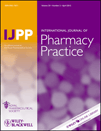How do pharmacy students learn professionalism?
Abstract
Objective To understand and clarify how professionalism is learnt, cultivated and facilitated in pharmacy education.
Methods Qualitative methodology involving three UK schools of pharmacy was used, including documentary analysis of course materials, interviews with seven teaching staff, six focus groups with 38 final-year pharmacy students and observation of professional pharmacy practice classes. We used a ‘curriculum mapping’ framework; analysis was thematic, with triangulation of methods and constant comparison between groups of participants and schools.
Key findings Students and teachers found defining professionalism difficult, but they identified common attitudinal and behavioural attributes. These were predominantly based on students' work experience, and role models were identified as particularly influential. Professionalism learning needed to be grounded and longitudinal throughout the curriculum. Practical classes and the use of real-life examples and role plays were influential; and teacher practitioners appeared particularly valuable due to their dual base in practice. Explicit statements in year books and codes of conduct were valuable, especially if they were reinforced and carried through.
Conclusions This study offers novel insights into professionalism learning during undergraduate education in the UK, by triangulating evidence from different sources and perspectives. It not only underpins the importance of professionalism learning but also highlights approaches which appeared valuable within the constraints of an otherwise artificial university environment.




